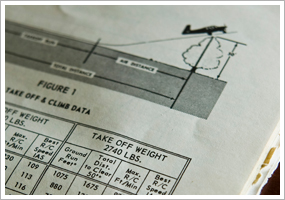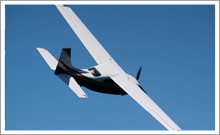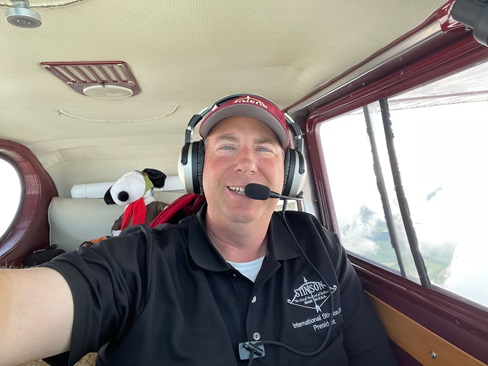| ||||
| | FT News | INSIDE AOPA | TRAINING PRODUCTS | FINAL EXAM | |||
TRAINING TIPsCategories and limits
When studying your aircraft’s features, you learned that useful load of a general aviation aircraft is defined in the Pilot’s Handbook of Aeronautical Knowledge as “the weight of the pilot, copilot, passengers, baggage, usable fuel, and drainable oil. It is the basic empty weight subtracted from the maximum allowable gross weight.” (See the Nov. 17, 2006, Training Tip.)
Here’s what gives your instructor’s question its spin: There may be more than one gross weight (or ramp weight) for your aircraft. You were asked to look up the useful load in the utility category. A 1986 Cessna Skyhawk is certified in the normal and utility categories, and it must be 300 pounds lighter on the ramp to be considered in the utility category than when ramp-ready as a normal-category aircraft. Empty weight doesn’t change, so how will this affect useful load? Another restriction in the utility category—in which higher maneuver stresses may be imposed on the airframe than in the normal category—is a prohibition on rear-seat occupancy and baggage compartment loadings.
Consider the impact of those changes on the Piper Warrior III, reviewed by Mark Twombly on AOPA Flight Training Online. “Subtracting the airplane's equipped empty weight of around 1,500 pounds from the utility weight limit leaves just 520 pounds for fuel and crew. That's not a lot, so crew and fuel weight must be carefully calculated when planning a flight to include these maneuvers.”
Know your trainer’s certification and associated limitations. And always read or listen carefully to questions before responding. The correct answer may be different from the first one that comes to mind! YOUR PARTNER IN TRAININGAre you frustrated in training and need some support? Or are you just looking to connect with other students and pilots? The best place to do it is on AOPA’s forums. The forums offer a great place to reach other flight instructors for questions or support, or information on everything from airplane maintenance to medical issues. Check them out today to connect with pilots all over the world.
Student pilots who join AOPA are three times more likely to complete their flight training. Membership includes unlimited access to aviation information by phone (800/USA-AOPA, weekdays from 8:30 a.m. to 6 p.m. Eastern time) or from AOPA Flight Training Online or AOPA Online. If you’re not already a member, join today and get the pilot’s edge. Login information is available online. FLIGHT TRAINING NEWSKing Schools awards sweepstakes airplaneHow would you like to be studying your King Schools private pilot course and get a call from John King telling you you’ve won an airplane? In what turned out to be some incredible timing, that’s exactly what happened to Rhonda Doyle, the winner of this year’s Cessna 172 sweepstakes airplane from the venerable flight training company. Doyle is a commercial-rated pilot who lives in Colorado. Read more >> Iowa community college offers online maintenance trainingIndian Hills Community College in Ottumwa, Iowa, will begin offering a new online maintenance course Feb. 22. The three-credit course is designed for aviation operations personnel, aircraft owners, pilots, mechanics, and ground support personnel, and teaches the basics of keeping an aircraft properly maintained for safe and legal operation. Topics include aircraft certification, repair and inspection responsibilities, record keeping, and airworthiness directive and safety bulletin compliance. For more information, see the Web site or call 800/726-2585, extension 5214. Embry-Riddle to train UAV pilotsEmbry-Riddle Aeronautical University’s Daytona Beach, Fla., campus will launch a minor in unmanned aircraft systems beginning with the fall semester. Students in the 15-credit minor will learn about the uses of civilian and military unmanned aerial vehicles (UAVs), how to select UAVs for civilian use; regulations governing their operation, and maintenance requirements. Embry-Riddle’s Next Generation Advanced Research Lab is developing a virtual-reality air traffic system that will allow students to fly a simulated unmanned aircraft. inside aopaAOPA adds new item to Insignia Merchandise CollectionThe AOPA Insignia Merchandise Collection available through Sporty’s is an exclusive selection of quality merchandise featuring the classic AOPA logo. Check out the latest addition to the collection, the AOPA Leading Edge Jacket, which offers modern styling and features a durable wind- and water-resistant exterior and a warm fleece interior, but is also lightweight and breathable. From the timeless appeal of an AOPA pilot cap to the Zulu time watch created exclusively for AOPA, there is something for everyone. Plus, every purchase helps generate revenue to help fund AOPA's daily effort to maintain the safety and freedom of flying. Be sure to use your AOPA WorldPoints Rewards credit card and earn double points. TRAINING PRODUCTSJeppesen products on saleGenerations of student pilots have come to know and trust Jeppesen training products for their high production quality and wealth of information. Now many of those products are on sale directly from Jeppesen’s new online store, JeppDirect.com. For a limited time, save up to 45 percent on everything from avionics training software to the company’s multiengine training textbook.
Note: Products listed have not been evaluated by ePilot editors unless otherwise noted. AOPA assumes no responsibility for products or services listed or for claims or actions by manufacturers or vendors. FINAL EXAMQuestion: I was reading Final Exam last week and saw a term I was not familiar with. What is shock cooling and how can I avoid it?
Answer: Shock cooling is the rapid cooling of hot engine metals. It can stress the engine components, leading to cracks in the cylinder heads. Shock cooling most often occurs during prolonged descents at very low power settings. Pilots can avoid shock cooling their engines by planning their descents ahead of time and maintaining some power during the descent. To learn more about shock cooling and engine operations in general, read this AOPA Air Safety Foundation Safety Advisor.
Got a question for our technical services staff? E-mail [email protected] or call the Pilot Information Center, 800/872-2672. Don’t forget the online archive of “Final Exam” questions and answers, searchable by keyword or topic. Picture Perfect
AVIATION EVENTS & WEATHER To submit an event or to search all events in the calendar, visit AOPA Online. For airport details, including FBO fuel prices, see AOPA’s Airport Directory Online. Flight Instructor Refresher ClinicsThe next AOPA Air Safety Foundation Flight Instructor Refresher Clinics are scheduled in Baton Rouge, La., Oklahoma City, Okla., Dallas, Texas, and Ashburn, Va., Feb. 27 and 28; Orlando, Fla., March 6 and 7; San Mateo, Calif., and Baltimore, Md., March 13 and 14; Ontario, Calif., March 20 and 21. For a complete schedule, see AOPA Online.
Can’t make it in person? Sign up for the CFI Refresher Online. AOPA Air Safety Foundation Safety SeminarsAOPA Air Safety Foundation Safety Seminars are scheduled in Colorado Springs, Colo., Feb. 24; Lake Buena Vista, Fla., Feb. 25; Rochester, Minn., March 8; Cedar Rapids, Iowa, and Portland, Ore., March 9; Seattle, Wash., and Olathe, Kan., March 10; Bedford, Mass., March 15; Ypsilanti, Mich., March 22; Birmingham, Ala., Northbrook, Ill., and Cleveland, Ohio, March 23. Topics vary—for details and a complete schedule, see AOPA Online. | Got news? Contact ePilot. Having difficulty using this service? Visit the ePilot Frequently Asked Questions now at AOPA Online or write to [email protected]. |
| Member Tools : Send feedback | Update member profile | Change email address | Unsubscribe | ePilot Archive Editorial Team: ePilot Flight Training Editor : Ian Twombly | ePilot Editor: Sarah Brown | Contributor: Alton Marsh |

 You and your flight instructor are reviewing for your upcoming flight test. The grilling has moved to your knowledge of your trainer’s design characteristics and performance—facts such as how much usable fuel your aircraft holds, as discussed in the
You and your flight instructor are reviewing for your upcoming flight test. The grilling has moved to your knowledge of your trainer’s design characteristics and performance—facts such as how much usable fuel your aircraft holds, as discussed in the 

